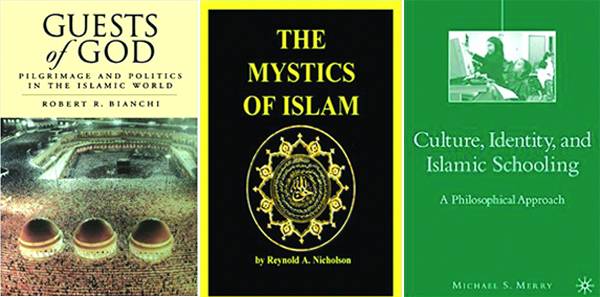
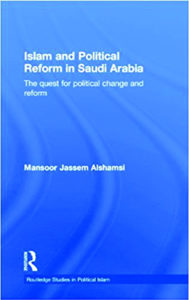
Islam and Political Reform in Saudi Arabia: The Quest for Political Change and Reform
Mansoor Jassem Alshamsi
Routledge (2011)
Rs10,372
This book examines the link between Islamic thought/jurisprudence on the one hand and political action on the other. It shows how reformism is deeply rooted in Islamic tradition and how Sunni scholars have become activists for change in Saudi Arabia. “… He focuses on three contemporary Islamic juridical scholars, Safar al-Hawai, Salman al-Oudah and Nassir al-Omar, all of whom advocate a return to the tenets of Islamic law. In the 1980s and early 1990s, the men lectured on government corruption, an imbalance of wealth and the alarming pact between the Saudi monarchy and the United States. Imprisoned without charges for five years, the three adopted a more conciliatory policy upon their release. Their taped lectures and TV appearances have spread their message far beyond Saudi academia. This account of their thoughts and the development of their religious/political platforms should be of interest to anyone attempting to understand Saudi Arabia today.” (Feb 2011 Book News Inc.)
“[Mansoor Jassem Alshamsi] elucidates the link that exists between Islamic jurisprudence and political action by focusing on the contributions of three leading ulema, namely Safar Al Hawali, Salman Al Awdah and Nasser Al Umar. By emphasising the discourses and performances of what he terms the ‘Saudi Sunni Islamic Reformist Leadership’, Alshamsi theorises and sets out to demonstrate that the very idea of reform is deeply rooted in Islamic tradition… This richly annotated book will delight the specialist but should not put off the lay reader. Given how little is actually recorded on what the three Saudi shaikhs uttered, this is a valuable addition to the growing literature on a critical topic.” (Joseph A. Kéchichian, Special to Weekend Review; Gulf News)
Mansoor Jassem Alshamsi, a political scientist working for the United Arab Emirates Government, received his PhD in Politics from the University of Exeter, UK, in 2004. The author of many research papers and studies on Middle Eastern affairs, US foreign policy and Islamic movements, Dr. Alshamsi emphasises the necessity of applying scientific and objective methods to the understanding of Middle Eastern politics.
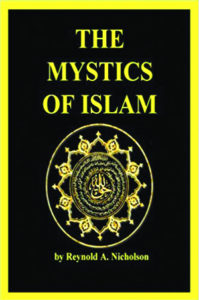
The Mystics of Islam Paperback
Reynold A. Nicholson
Penguin (2007)
Rs1,104
Sufism is a mystic tradition within Islam that encompasses a diverse range of beliefs and practices dedicated to Divine love and the cultivation of the elements of the Divine within the individual human being. Practitioners of this tradition are known as “Sufis” generally, though some senior members of the tradition reserve this term for those who have attained the goals of the tradition. Although some people refer to this tradition as Sufism, others refer to it as the Sufi Way. They draw this distinction because they feel that the term “Sufism” refers to a philosophy or a school of thought like capitalism or socialism, and they feel that the Sufi Way describes a practical path to follow.
Nicholson was Sir Thomas Adams Professor of Arabic at the University of Cambridge, and a distinguished editor and translator.
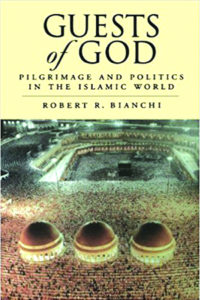
Guests of God: Pilgrimage and Politics in the Islamic World
Robert R. Bianchi
OUP (2008)
Rs4,216
Each year, more than two million pilgrims from over 100 countries converge on the holy city of Mecca to reenact the rituals that Muslims have been performing for centuries. While it is first and foremost a religious event, the Hajj is also a major political event. The Muslim world’s leading multinational organization, the Organization of the Islamic Conference, has established the first international regime explicitly devoted to pilgrimage. Every large Muslim nation has developed a comprehensive Hajj policy and a powerful bureaucracy to enforce it. Yet no authority–secular or religious, national or international–can really control the Hajj. Pilgrims believe that they are entitled to travel freely to Mecca as “Guests of God”–not as guests of any nation or organization that might wish to restrict or profit from their efforts to fulfill a fundamental religious obligation. Blending social science with the humanities and international law, Guests of God tells the stories of hajjis and Hajj managers from Nigeria, Turkey, and Saudi Arabia to Pakistan, Malaysia, and Indonesia exploring one of the greatest human experiences of our time.
Robert R. Bianchi has taught political science at the American University in Cairo, the University of Pennsylvania, and the University of Chicago. He is the author of Interest Groups and Political Development in Turkey (1984) and Unruly Corporatism: Associational Life in Twentieth-Century Egypt (1989). He performed the Hajj in 1989.
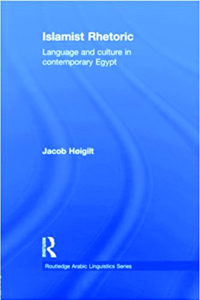
Islamist Rhetoric; Language and Culture in Contemporary Egypt
Jacob Hoigilt
Routledge (2011)
Rs11,063
Islamism in Egypt is more diversified in terms of its sociology and ideology than is usually assumed. Through linguistic analysis of Islamist rhetoric, this book sheds light upon attitudes towards other Muslims, religious authority and secular society.
Examining the rhetoric of three central Islamist figures in Egypt today - Yusuf al-Qaradawi, Amr Khalid and Muhammad Imara - the author investigates the connection between Islamist rhetoric and the social and political structures of the Islamic field in Egypt. Highlighting the diversity of Islamist rhetoric, the author argues that differences of form disclose sociological and ideological tensions. Grounded in Systemic Functional Grammar, the book explores three linguistic areas in detail: pronoun use, mood choices and configurations of processes and participants. The author explores how the writers relate to their readers and how they construe concepts that are central in the current Islamic revival, such as ‘Islamic thought’, ‘Muslims’, and ‘the West’.
Introducing an alternative divide in Egyptian public debate - between text cultures rather than ideologies - this book approaches the topic of Islamism from a unique analytical perspective, offering an important addition to the existing literature in the areas of Middle Eastern society and politics, Arabic language and religious studies.
Jacob Høigilt is a Middle East researcher at Fafo Institute for Applied International Studies in Oslo, Norway. His main research interests include Islamism, Arabic sociolinguistics and politics in the Arab world.
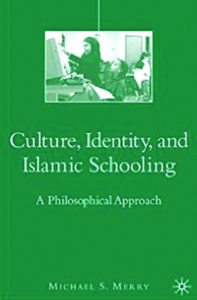
Culture, Identity, and Islamic Schooling; A Philosophical Approach
Michael S. Merry
Palgrave (2007)
Rs5,877
In light of the growing phenomenon of Islamic schools in the United States and Europe, this compelling study outlines whether these schools share similar traits with other religious schools, while posing new challenges to education policy. Merry elaborates an ideal type of Islamic philosophy of education in order to examine the specific challenges that Islamic schools face, comparing the different educational realities facing Muslim populations in the Netherlands, Belgium, and the United States.
“There is much to admire in this book. Merry is a very skilful academic writer and he argues in a logical and engaging manner, incorporating extensive and interesting footnotes. This is an important book and a significant contribution to scholarship. It is highly recommended.” (Stephen J. McKinney, University of Glasgow).
“Especially since 9/11, the West has experienced a desperate need to better understand the Islamic world. In this balanced but critical study, Michael S. Merry tackles the highly controversial issue of identity formation and the education of Muslim children in non-Muslim or even anti-Muslim cultures. In accessible language, Merry articulates the philosophical and political underpinnings of Islamic schooling and then confronts these with the empirical practices of the US, the Netherlands, and Belgium. He not only presents a fully substantiated analysis of the pros and cons of Islamic schooling but also places this analysis within the wider context of the demands and rights of parents, the position of the child, religious education in general, and the obligations of the democratic state for the future of its children. This thought-provoking book is a must for the international audience of educators, policymakers, religious scholars, and philosophers interested in schooling and Islam.” (Geert Driessen, Senior Educational Researcher, Radboud University Nijmegen).
“This book is a critical defense of the possibility of religious schooling, in general, and Islamic schooling, in particular that is consistent with the tenets of multicultural, liberal democracy. It is well written, thoughtful, well argued and timely given the current interest in Islamic education, Muslim immigration, and tensions between Islam and democratic societies. Since it is largely a philosophical argument about rather perennial tensions between religious schools and liberal democracy, it is likely to have a longer shelf life than more empirical studies.” (Jeffrey A. Milligan, Florida State University)
Michael S. Merry is Visiting Assistant Professor in Educational Studies, Department of Education and Youth Studies, Beloit College, USA.

